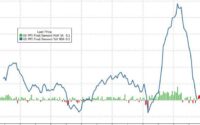The “gentle and forgiving path” taken by developed-market central banks to rein in inflation over the past year is likely to prove unsuccessful and trigger the need for more forceful, biblical-type action.
That’s the view of economists Bruce Kasman, Joseph Lupton and Michael Hanson of JPMorgan Chase & Co.
JPM,
who described the response of central bankers in the past year as embodying “a New Testament–style grace” — in terms of keeping the economic expansion going and tolerating a gradual decline in inflation. Rate hikes so far have been “a correction from inappropriately accommodative stances rather than an attempt to smite out the expansion,” they said.
On Monday, investors attempted to recover from weeks of volatility driven by a stream of unexpectedly strong U.S. economic data, pushing up expectations for continued rate hikes by the Federal Reserve. All three major U.S. stock indexes
DJIA,
SPX,
COMP,
were looking to rebound after booking weekly losses, while Treasury yields were mixed after 2- and 10-year rates jumped for a fifth straight week and the ICE U.S. Dollar Index
DXY,
was off 0.4%.
Don’t miss: Will recession slam the stock market? Here are 3 ‘landing’ scenarios as Fed keeps up the inflation fight.
Attention now turns to developments coming later this week. Thursday brings an inflation update from the eurozone, which is expected to set the tone for bond markets, as well as the account of the European Central Bank’s most recent meeting. In the U.S., markets expect the Fed to end up lifting its targeted federal funds rate to 5.4% from the 5.1% median forecast for 2023 among policy makers in December. Deutsche Bank
DB,
remains an outlier, with a call for a 5.6% terminal fed funds rate.
Over the past year, developed-market central banks have delivered rate hikes of roughly 300 basis points or more each, according to JPMorgan.
The Fed has gone even further, hiking 450 basis points, taking its main policy rate to between 4.5% and 4.75% from almost zero last March, but opted for a smaller rate hike at its Jan. 31-Feb. 1 meeting, when it lifted rates by only a quarter-point.
“Recent developments suggest this gentle and forgiving path will prove unsuccessful,” Kasman, Lupton and Hanson wrote, in a Friday note. “The risk of triggering a more wrathful Old Testament–style central-bank reaction is on the rise. The transmission of the rapid shift in policy still underway also raises the risk of a recession not intended by central banks.”
Opinion: ‘We remain in the soft-landing club’: Strategist Ed Yardeni’s bullish scenario puts S&P 500 up more than 20% by end of 2023
Traders are bracing for another surge in market volatility by scooping up hedges. NatWest Markets and Nomura
8604,
are now forecasting a half-percentage-point rate hike by the Fed in March, while Ben McLannahan, Sue Ho and Nick Gentle of Barclays
BCS,
said the possibility of a half-point hike is growing. Researchers at Goldman Sachs
GS,
researchers also see hawkish risks building.
“Asset prices are sensitive to shifting probabilities around recession timing and rate paths,” JPMorgan’s economists said. They’re placing 70% odds on a recession starting in late 2023 or 2024, and a 30% chance on a soft-landing scenario that sees only slowing growth — both of which are conditioned upon being able to avoid a near-term downturn.
From there, the economists consider two alternate paths. One is that any recession late this year is concentrated in the U.S., assuming rate hikes end in the second quarter and roughly 500 basis points of tightening works its way through the economy. The second is that resilient growth and elevated inflation force the Fed and central banks in Western Europe to turn more restrictive, with sustained tightening during the second half of the year becoming “a recipe for a deeper recession that starts later and is more synchronized globally.”


